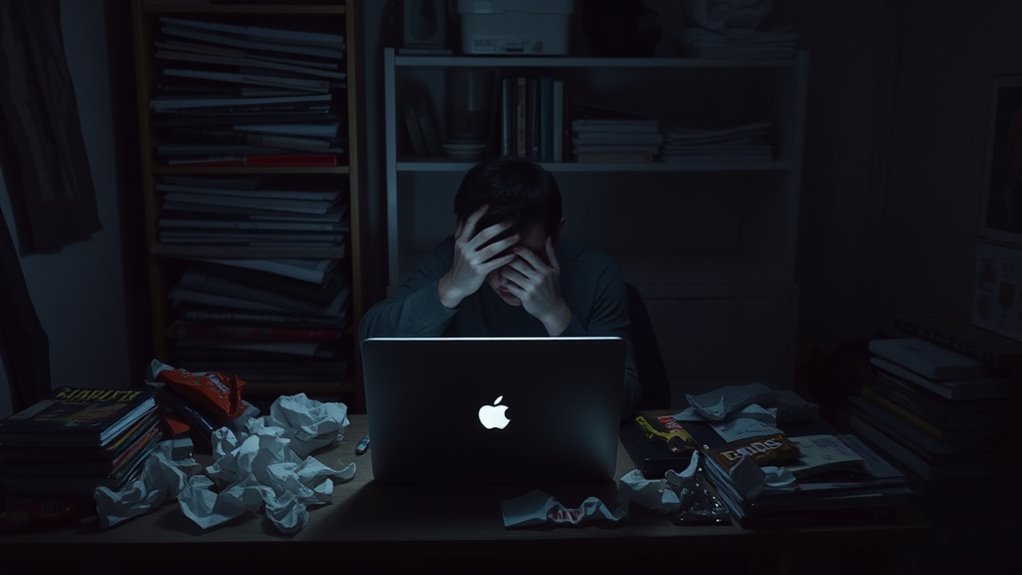Porn addiction is a compulsive behavior that rewires your brain by releasing dopamine, creating a reward loop that drives you to seek more explicit content. You might notice escalating cravings, difficulty stopping, or interference with daily responsibilities. Over time, it can lead to feelings of shame, isolation, and a distorted view of intimacy. Recognizing these signs is the first step—continue to explore how this addiction affects you and ways to regain control.
Key Takeaways
- Porn addiction is a compulsive behavior that rewires the brain through dopamine, leading to dependency and escalating consumption.
- Warning signs include increasing need for more explicit content, tolerance, and interference with daily responsibilities.
- It often causes emotional issues like anxiety, depression, and social withdrawal, affecting real-life relationships.
- Recognizing early signs helps in intervention, such as hiding habits, excessive browsing, or feeling guilt after use.
- Recovery involves healthy coping strategies, support networks, and understanding brain chemistry to break the addictive cycle.

Have you ever wondered what makes porn addiction so difficult to break? It’s a question many people ask themselves when they find themselves caught in a cycle they can’t seem to escape. Porn addiction isn’t just about occasional viewing; it’s a compulsive behavior that can take over your thoughts, feelings, and daily routines. When you start to rely on pornography to manage stress, loneliness, or boredom, it becomes more than just a habit—it transforms into a dependency that rewires your brain. This dependency triggers the release of chemicals like dopamine, which reinforce the behavior and make it harder to stop. Over time, your brain begins to associate porn with reward and relief, creating a powerful loop that’s tough to break free from.
Recognizing the warning signs early can help you regain control before the addiction takes a stronger hold. One of the most obvious signs is an increasing need to watch more explicit or intense content to achieve the same level of satisfaction. This escalation is similar to building a tolerance, where what once satisfied no longer does the trick, prompting you to seek out more extreme material. You might notice that your porn use begins to interfere with your daily responsibilities, such as neglecting work, school, or relationships. Maybe you hide your viewing habits out of shame or guilt, feeling anxious or defensive when asked about your habits. If you find yourself spending excessive amounts of time browsing, planning, or recovering from porn sessions, these are clear indicators that your behavior has become compulsive.
Another warning sign is that your porn consumption starts to impact your emotional health. You may feel more isolated, anxious, or depressed, especially if you’re using porn as an escape from real-world problems. It can also distort your expectations about intimacy and sex, leading to dissatisfaction in real relationships. If you notice that your desire for real intimacy diminishes or that you’re withdrawing socially, it’s a sign that your addiction is affecting your overall well-being. Incorporating healthy coping strategies such as meditation, exercise, or seeking support can help break the cycle and restore balance. Understanding the brain’s response to addictive behaviors can motivate you to seek appropriate help and support networks. Recognizing how neurochemical processes influence your cravings can empower you to develop effective strategies for recovery. Additionally, learning about the impact of dopamine release and how it reinforces addictive behaviors can provide motivation for change. The key is honesty with yourself and acknowledging when your habits are no longer healthy or sustainable. Developing awareness about how the brain reacts to addictive behaviors can be a crucial step in overcoming the cycle and achieving recovery.
Frequently Asked Questions
Can Porn Addiction Be Genetic or Hereditary?
You might wonder if porn addiction runs in families. While there’s no direct evidence that it’s purely genetic, genetics can influence traits like impulsivity or susceptibility to addiction. Your environment and experiences play significant roles too. If someone in your family struggles with addictive behaviors, you could be more vulnerable. Recognizing these factors helps you understand that addiction is often a mix of biological, psychological, and environmental influences.
How Effective Are Therapy Options for Porn Addiction?
Therapy options can be quite effective for overcoming porn addiction. You might find that approaches like cognitive-behavioral therapy help you identify and change harmful patterns. Therapy provides a safe space to explore underlying issues and develop healthier coping strategies. Consistent sessions, combined with support from loved ones, increase your chances of success. Remember, progress varies, but with commitment, therapy can substantially aid your recovery process.
Is Porn Addiction Linked to Other Mental Health Issues?
Imagine your mind as a busy city, with roads connecting different neighborhoods. When you struggle with porn addiction, these roads can become congested, linking to other mental health issues like anxiety, depression, or low self-esteem. You might find yourself feeling overwhelmed or trapped, as these issues intertwine. Recognizing this connection helps you understand that addressing underlying mental health concerns can lead to a healthier, clearer mental landscape.
What Are the Long-Term Consequences of Porn Addiction?
You might not realize it, but long-term porn addiction can seriously impact your life. It can lead to relationship issues, decreased intimacy, and poor self-esteem. You may also experience difficulty focusing, emotional numbness, or increased anxiety. Over time, these problems can worsen, affecting your mental health and overall well-being. Recognizing these consequences early helps you take steps to seek help and regain control of your life.
How Can Loved Ones Support Someone Struggling With Porn Addiction?
Did you know that 64% of people believe loved ones can help with addiction recovery? You can support someone struggling with porn addiction by approaching them with compassion and understanding. Encourage open, honest conversations without judgment, and offer to help find professional support if they’re willing. Your patience and consistent reassurance can make a real difference, helping them feel safe and motivated to seek healthier habits.
Conclusion
Recognizing the signs of porn addiction is like catching a shadow before it slips away—you hold the power to act. Don’t let it silently steal your time, focus, or confidence. By understanding the warning signs, you take the first step toward reclaiming control. Remember, you’re not alone in this journey. With awareness and support, you can break free and embrace a healthier, more balanced life. Your future self will thank you for choosing to see the light.









